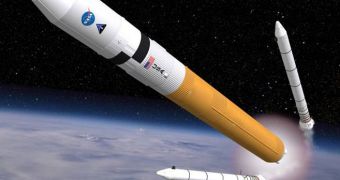Under US President Barack Obama's new budget proposal, NASA is to spend the next five years searching for alternatives to the ARES V heavy-lift delivery system. The massive rocket was a part of the now-proposed-for-cancellation Project Constellation, but a review panel found it to be insufficiently advanced and too cost-intensive to proceed. Therefore, Obama proposed that NASA canceled the Project, and that all efforts should be oriented towards funding private space companies for creating spacecrafts for delivering astronauts to the International Space Station (ISS).
But the White House in the end recognized the importance of developing a heavy-lift delivery system. At one point, Obama said that the American space agency would have the next five years to contemplate the idea, analyze proposals, and then finally decide on an efficient and cheap design. But, according to some analysts, it may be that this will not actually happen. In other words, it would appear that NASA is already looking to the private sector for proposals on how the country's next heavy-lift rocket should look like, Space reports.
“We're going to go with the most affordable system. And OMB (White House Office of Management and Budget ) and OSTP (Office of Science and Technology Policy) actually agreed to that,” explains the deputy director of the space agency's Constellation Systems Division, Cris Guidi. “NASA is currently in a very odd position that we are straddling [fiscal 2010] appropriations as well as what the president recommended for [fiscal 2011], which has not been approved,” she added, referring to the fact that Obama's new plans have yet to be approved in Congress. Various senators and representatives have vowed to stop its approval any way they can.
The goals of the new efforts is “to drop the cost of launch, and the propulsion system is the predominant cost factor in any launch system. But it's more to stabilize the industrial base and maintain the critical skills of propulsion-system development in the US,” Guidi adds, revealing that, when the ARES V rocket was first thought off, keeping costs down was not exactly NASA's primary option. Performance was key. “Obviously we don't have the budget to maintain the current course of Constellation. Our goal is affordability. Let's not build that Maserati. Let's make do with maybe a Toyota, as long as we get our mission accomplished in an affordable, reliable, operable manner. That's our best approach rather than having a system that operates on the margins and is very intricate,” the official concludes.

 14 DAY TRIAL //
14 DAY TRIAL //